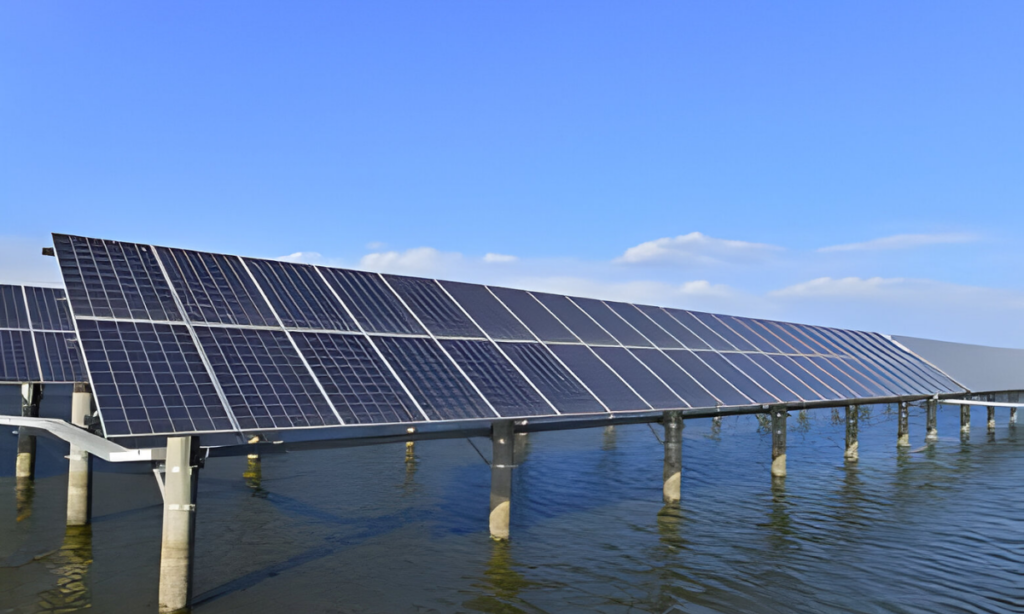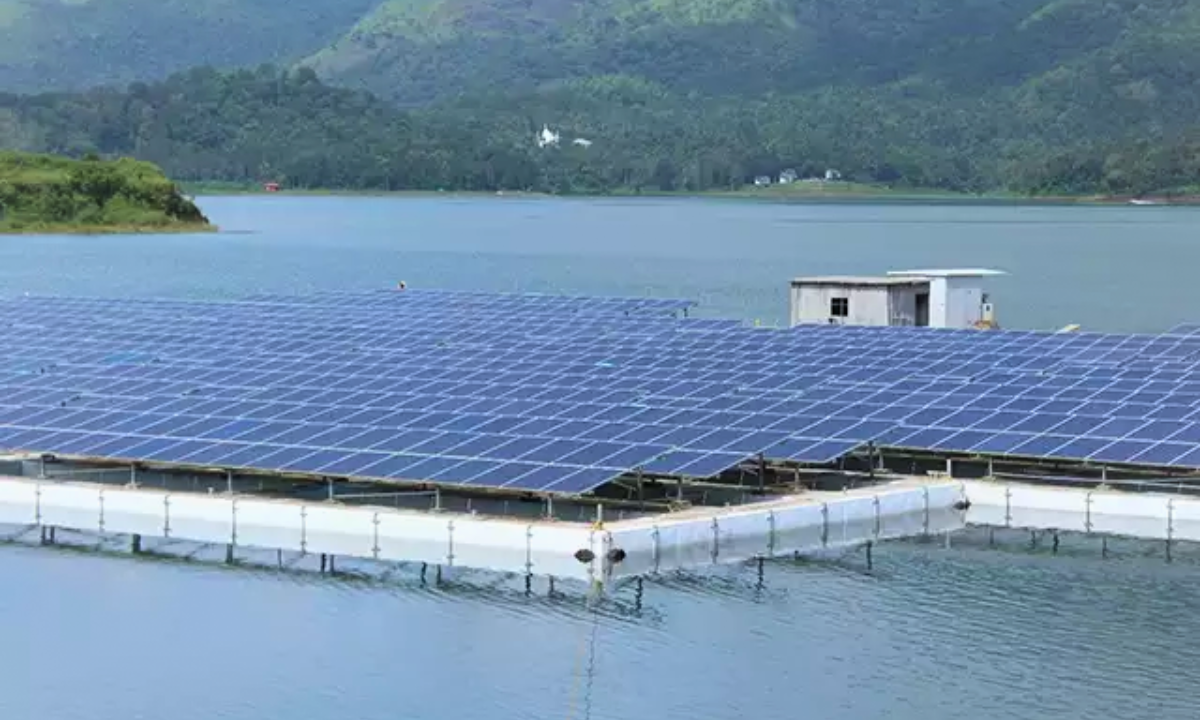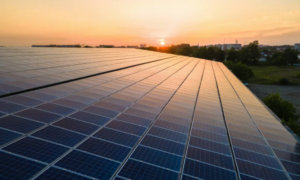Floating solar power plant in India are becoming more and more well-liked as a cutting-edge approach to producing solar energy that is renewable and efficient concerning resources. Because these solar plants are constructed as floating structures, primarily atop artificial reservoirs and other bodies of water, photovoltaic panels may be installed without taking up extra land.
With land availability a major constraint for scaling up solar power in India, floating plants are viewed as a viable solution. This article will look at the key reasons for the rising adoption of floating solar technology and the advantages it provides. It will also discuss the future potential of floating solar in India.
Floating Solar panels in India are being installed more and more across India for both personal and professional use. Solar power installations are expanding rapidly, ranging from small residential systems to big industrial facilities. The manufacturing of solar panels within the country has also been steadily increasing. Some states have also introduced policies that motivate households and businesses to set up solar panels on their rooftops.
To cater to the growing need for solar panels and ensure availability even in remote areas, many companies have started serving as distributors. Solar Panel distributors in India stock different types of solar panels from various brands and offer them to potential customers. Some even provide overall solar solutions right from panels, and mounting structures to inverters. Distributors help make solar systems accessible even in smaller towns and rural interiors of India.
Leveraging Available Water Resources
India has an abundance of water resources with thousands of reservoirs across the country. However, most of these spaces lying idle could be potentially used for setting up floating solar power plant in India. States like Kerala, Assam, and Uttarakhand which have extensive river and canal networks have shown interest in developing floating solar projects.
The Konkan region of Maharashtra too has explored this option by installing a 100 kilowatt pilot floating solar plant in 2019. Large floating solar parks within dams and reservoirs are being actively investigated by several other governments. Because these bodies of water are easily accessible, floating solar maximizes the utilization of current infrastructure and reduces the need for additional land acquisition.
Dual Benefits of Floating Solar Power Plant in India and Water Management

Another driver for floating solar adoption is the dual environmental benefits it provides. By creating shade, the solar panels over the water aid in lowering evaporation from the exposed surface. Benefits include reduced water treatment expenses and increased water retention in reservoirs all year round. At the same time, the vegetation growth over the water is controlled due to less sunlight.
Floating solar power plant in India is a desirable sustainable option since they improve water management and generate clean electricity. Research has indicated that solar panels can regulate evaporation by as much as 70%, underscoring the device’s potential to conserve water in regions with limited water resources.
Higher Solar Radiation Than Ground Mounted Plants
An important technical advantage of floating solar is higher solar irradiation compared to conventional land-based installation. The water bodies act as reflective surfaces, increasing the solar exposure on panel surfaces by 15-25% more than on land. This boosts the power generation capability. There is also better heat absorption by water keeping panel temperatures lower in a floating setup.
As panel efficiency is directly related to operating temperature, floating variations perform at a higher level throughout the year. Their levelized cost of energy production is estimated to be 5-10% less than similar land-based projects of similar capacities.
Modular Design and Quick Installation of Floating Solar Power Plant in India
The modular design approach followed for floating solar distinguishes it from large-scale land plants. Prefabricated solar modules mounted on floating platforms like piled frameworks or inflatable plastic floats can be rapidly deployed with minimum civil works. Several small projects can be set up parallelly across the water body. Their scalability and decentralized installation pattern suit the increasingly distributed nature of Indian power system needs.
Quick commissioning times of just 3-6 months compared to 1-2 years for land projects is a key financial and operational advantage according to experts. Annualized returns are higher due to speedier capacity addition using this modular, distributed model of floating plants.
Lower Impact on Land Use and Wildlife
Unlike land-intensive solar farms, floating arrays have an insignificant footprint on land. Valuable agricultural, grazing, or forest lands are thus preserved for primary uses. The panels mounted above water also have negligible impacts on ground vegetation, natural water flows, or wildlife movement on the ground. Bird or animal life around water resources remains undisrupted.
Any disturbances to local ecology are therefore much lower compared to massive land solar projects. This environmental compatibility has won floating solar acceptance from green stakeholders in several locations. Some see it together with other renewable options like rooftop solar as less intrusive alternatives to mega land-based grids.
Outlook and Policy Support
With falling solar tariffs and an evolving regulatory framework, India’s floating solar capacity is projected to exceed 5GW by 2025 from less than 100MW currently according to industry estimates. Some challenges remain around additional infrastructural costs, mooring mechanisms, module corrosion protection in saline water, grid integration, etc.
However, these are steadily being addressed with ongoing demonstrations and research. The Government of India too has extended necessary policy support through schemes like KUSUM to encourage farmers to set up solar plants on ponds and other water bodies. With further cost reductions projected this decade, floating solar has immense scalable potential to effectively meet India’s renewable energy targets in coming years.
How does a Floating Solar Power Plant in India Provide electricity access to rural communities?
Small floating solar systems that are suitable for village ponds and lakes provide power in a decentralized manner. In rural locations, this power can be used for household and agricultural needs. Individual farmers or cooperatives can install such small floating solar units on their ponds/reservoirs to meet local energy needs.
This helps to provide rural populations with access to power and offers farmers new sources of income. Many towns now have a better quality of life because of these small-scale solar arrays powerhouses, small businesses, and irrigation pumps.
Farmers’ cooperatives are taking the lead in various regions to install and manage community-level floating solar projects inexpensively and sustainably to electrify their villages.
Conclusion
In conclusion, a floating solar power plant in India provides a feasible means of boosting sustainable energy output while optimizing the country’s vast, untapped water resources. It is the ideal strategic application of solar power in the future due to its technological advantages, which include better output, lower costs, faster deployment, and less land consumption.
With various environmental and resource use benefits as well, floating solar deserves wider uptake across Indian states. With the right legislation, innovative business models, and the use of its natural resources, India has the potential to lead the world in the solar industry.
Future widespread adoption of floating solar would also be encouraged by more advancements in technology and lower installation costs.
Sun-AP A distributor based in India, Ecopower specializes in offering bespoke floating solar solutions. Among their noteworthy initiatives is the installation of solar panels floating above reservoirs in Gujarat and Kerala.





